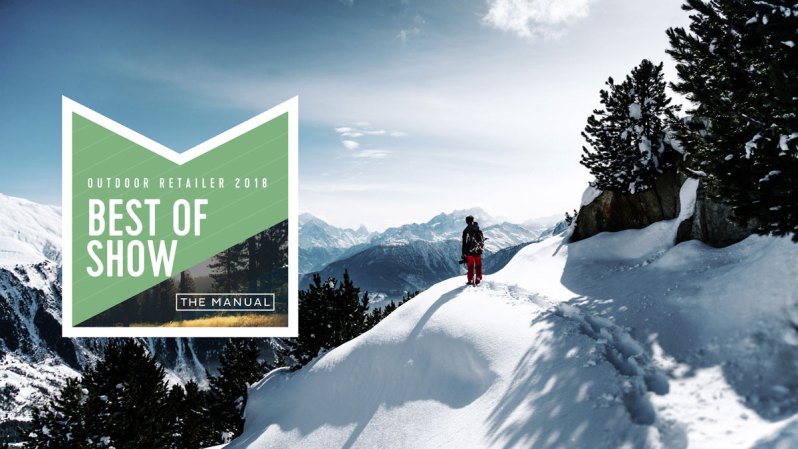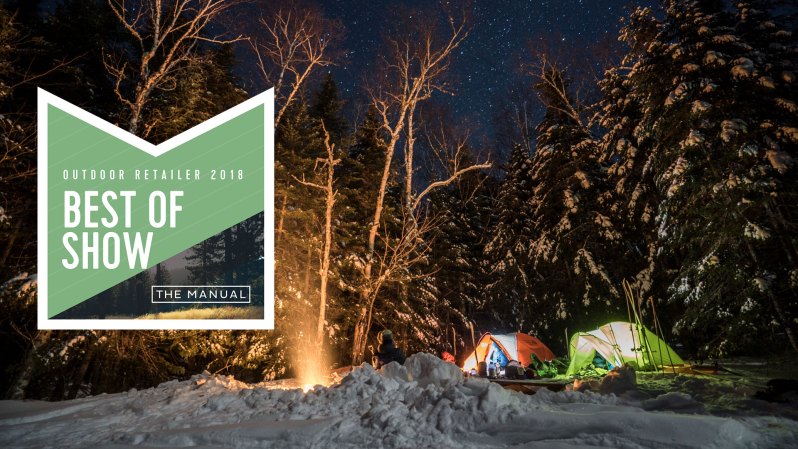
Each year the outdoor community comes together for Outdoor Retailer, the largest outdoor sport and gear trade show in the country. And each year, The Manual is there to judge it all. From January 25-28, Denver (bye-bye, Salt Lake City) welcomed hundreds of the world’s top brands to showcase all the latest and greatest outdoor winter gear and innovations under one roof . From snowboards and skis to camp gear and apparel, Outdoor Retailer offers anything a guy could ever want to get outside and get active. After three days walking the floor (to the tune of 24 total accumulated miles) seeking out the best of what the show had to offer, we narrowed our selection down to the top ten best products and brands to help you prep for your next outdoor adventure.

Best Camp Cooking: Wolf & Grizzly Grill
Prior to Wolf & Grizzly’s successful Kickstarter campaign that brought us the WG Grill, campfire cooks everywhere had a couple of vastly disparate choices for a grill grate: either they used a flimsy, cheap, and ugly version that wouldn’t last more than a couple of camping seasons or overcompensated with something so sturdy, solid, and built to last that you never actually used it because of its weight and lack of portability. With the WG Grill, that’s all in the past, since this is lightweight (2.2 pounds), made from stainless steel (no rusting), and is adjustable to up to three heights: from 6.5 inches to 8.5 inches to lying flat (meaning you can place between two objects around a fire for any height). Perfect for backpacking, camping, or just cooking over an open fire in your backyard.

Best Technical Shoe: Under Armour Trail Runner Horizon RTT with Gore-Tex
For those who prefer to run out in nature, Under Armour’s just announced Trail Runner Horizon RTT shoes with Gore-Tex are perfect. With a high traction rubber-lug outsole, a durable and breathable upper, and a Gore-Tex lining, these new and improved trail runners are not only super comfortable, they’re also great on slick surfaces (like mud, loose gravel, and dry dirt and will keep your feet totally dry, no matter the precipitation. The addition of waterproof Gore-Tex also makes these shoes great for light hiking, so now day hikers and weekend backpackers can hit the trails without the weight of your standard hiking boot.

Best Lifestyle Shoe: Wolverine 1000 Mile Boot with Arctic Grip Vibram Outsole
Wolverine’s 1000 Mile boot has been on The Manual’s list of best men’s boots since the beginning, but this year’s addition of an Arctic Grip Vibram outsole just rocketed these boots from fashion-forward to a hands-down winner. Using “wet ice technology,” the Arctic Grip sole sports an almost sandpaper-like bottom that grabs onto ice (even wet ice) and holds firm. Previous iterations of the Wolverine 1000 Mile featured Vibram outsoles, but none with their Arctic Grip tech, meaning slipping and sliding was a very real danger. Now any guy can pound the ice-coated pavement without sacrificing safety for style.

Best Snow Goggle: Oakley Prizm React
It’s no secret that Oakley lenses are unrivaled in their optical innovation — especially the Prizm Snow collection, which enhances contrast and visibility over a wide range of light conditions. Oakley has reinvented its Snow Goggle again with their new revolutionary electrothermic Prizm React technology (launching fall 2018) that allows skiers and snowboarders to adjust the contrast of their lenses with just the touch of a button. As Oakley says, “Now riders can take control of the amount of light that reaches their eyes without having to interrupt their day on the mountain.” A glove-friendly button sets the lens tint to dark, medium, or light. After trying the it out ourselves, we have to confirm, this tech is not only legit, it’s almost entirely invisible because of the smart way Oakley has integrated the electronics into the frame, making the Prizm React feel exactly like normal goggles.

Best Brand Coalition: Maine Outdoor Brands
The sheer magnitude and beauty of Maine’s mostly forested wilderness is part of the lure that draws outdoorsmen from all over the world to the East Coast’s northernmost state. Unfortunately, Maine’s economy has suffered recently because of an exodus of the young and educated, and the state cannot make up for that loss through natural beauty alone. This is where Maine Outdoor Brands comes in — a collective of non-competing, outdoor-oriented companies that includes the likes of L.L. Bean, Hyperlite, and Outside TV. MOB acts as a cheerleader and mouthpiece for Maine’s outdoor industry, all while helping to hire and retain younger employees. Maine Outdoor Brands is also “committed to working with individuals and organizations from the public and private sectors in helping to drive Maine’s $8.2 billion outdoor recreation economy, and in the process, creating a brighter economic future for our state.”
Best Auto: Cake Bikes
We could give you an impressive array of statistics and specs when it comes to Cake’s Kalk bike, but instead we’ll just tell you that it’s an entirely electric, silent, and eco-friendly dirtbike that weights 155 pounds, can go 40 mph, and will take you off-road whenever your fancy strikes. The Cake Kalk is available for pre-order, but only 50 units are planned for production. Pricing is $14,000. Check out our in-depth coverage of the Kalk bike here.

Best Camp Food: Good To-Go
Most dehydrated camp food is just bleh. Sure, there’s the occasional tasty packet of chicken and dumplings, but for the most part, campers and backpackers aren’t expecting anything close to gourmet. Good To-Go brand camp meals, with their classically-trained chef and co-founder, Jennifer Scism, begs to differ. Hand-made in Maine by Scism and her team, Good To-Go meals currently come in flavors such as smoked three bean chili, bibimbop, and Thai curry. All meals are gluten-free, low in sodium, and made without preservatives, meaning you’re actually getting real food that, with just a few minutes and boiling water, is truly good-to-go.

Best Lifestyle Wear: Obermeyer Fall Heritage Collection
Since 1947, Obermeyer has been making snow sports apparel that is both functional and stylish. For the 2018-2019 fall season, Obermeyer reached back into their archives to create their first fall heritage collection. Using modern fabrics and technical gear in combination with archival designs that hark back to the ’60s, ’70s, and ’80s, the upcoming collection wraps tried-and-true outwear in timeless fashion. With vintage-inspired vests featuring 550 fill power duck down, a down snowshirt that can go from slope to apres ski without a second thought, and the Dusty Down Jacket with color blocking reminiscent of your dad’s 40-year-old snowmobiling suit, Obermeyer’s heritage collection came out head and shoulders above the rest of Outdoor Retailer’s lifestyle collections.

Best Design: Snow Peak Camping Gear
Japanese outdoor outfitter, Snow Peak, makes some of the most beautiful camping gear on the planet, and that’s reason enough for us to award them Best Design at Outdoor Retailer 2018. From their modular camp cooking set-up, to their amazing hot-dog fishing rod, to their upcoming apparel releases, each item coming out of Snow Peak’s design facility is expertly crafted and thoughtfully constructed. We’re particularly pleased with the camp coffee system and field cooker pro set.

Best Tech: HydraLight
Winning last year’s combined Innovation Award between The Manual and our brother site, Digital Trends, HydraLight couldn’t go another year without winning a trophy because, come on, powering a lantern or a flashlight with just a powercell and some water comes really, really close to being actual magic. Sure, there’s a good amount of science behind the Aussie invention, but that’s less important than the fact that they can run for hundreds of hours without their powercells needing refurbishing and, if you’re a doomsday prepper, they can safely be stored for up to 25 years before their first use without compromising functionality.

The following Innovation Awards were chosen in conjunction with our brother site, Digital Trends, and the outdoor editor, Rick Stella.

Innovation Award: Spy Ace EC Goggle
As any seasoned skier or snowboarder can attest, heading to the mountain with just one goggle lens can be a fool’s errand. Perhaps it’s sunny when you leave home but cloudy on the hill – or vice versa – and what you brought won’t cut it. This problem is exactly what Spy hopes to solve with its recently unveiled Ace EC goggle which allows riders to quickly transition between three separate tints with the simple press of a button. Built using electrochromic technology, the lens uses a small electronic pulse to shift between tints good for sunny, bluebird days, mixed conditions, or flat weather visibility. Better yet, each tint takes just four to eight seconds to swap between meaning anyone can change their perspective on the fly. The goggles do require a charge to function – which is a bit of a drag – but in practice, they function as well (if not better) as they look on paper.
For more information, head to Digital Trends.

Innovation Award: LifeStraw Lead
As reliable as they are useful, LifeStraw’s lineup of water filters have helped thousands of people stay hydrated in the wilderness without running the risk of becoming ill. Having championed the removal of bacteria and other contaminants that make water unsafe to drink, LifeStraw debuted a new line of filters at this year’s Outdoor Retailer show built to reduce lead. Though lead isn’t necessarily a contaminant typically found by hikers or backpackers, the new device would prove essential for developing countries or areas hit by natural disasters. In addition to nixing 99.999999 percent of waterborne protozoa and bacteria, LifeStraw’s lead filters meet or exceed the standards set by the National Sanitation Foundation for lead reduction. By improving on its existing tech to positively benefit those in need, LifeStraw’s role as innovator is a prestigious one.
For more information, head to Digital Trends.

Innovation Award: 686 Hydrastash Jacket
Perhaps one of the more fun ways to exercise, skiing and snowboarding is like a workout in disguise. Because of that, it’s important to stay hydrated while on the mountain. Unfortunately, this means either carrying a clunky backpack or taking frequent breaks to hit the lodge for a quick swig of water. Then there’s 686’s Hydrastash jacket which features a micro-hydration system built into the coat’s powder skirt, offering quick access to water (or other beverage of choice). The company even says the reservoir utilizes a wearer’s body heat to avoid freezing – something most hydration packs have trouble with. It even features a series of anti-slosh dams which help the liquid stay in place instead of throwing off a wearer’s balance.
For more information, head to Digital Trends.

Innovation Award: Capita FUS3D Technology
Since its inception, snowboard manufacturing has produced a ton of waste. By attaching four pieces of ABS plastic to a wood core board, companies would often be left with heaps of leftover material after a laborious process. In an attempt to reimagine the wheel, Capita Snowboards turned to a 3D printing approach called Fused Deposition Modeling which allows it to cut a single piece of custom sidewall to attach to a board’s core. While other attempts at this in the past have compromised a board’s durability, Capita’s latest development dramatically increases its strength while also adding a host of performance improvements such as more responsiveness and flexibility. An innovative achievement, Capita unveiled the tech at Outdoor Retailer in its Spring Break line of boards but plans on implementing the unique 3D printing approach across its entire lineup next season.
For more information, head to Digital Trends.



